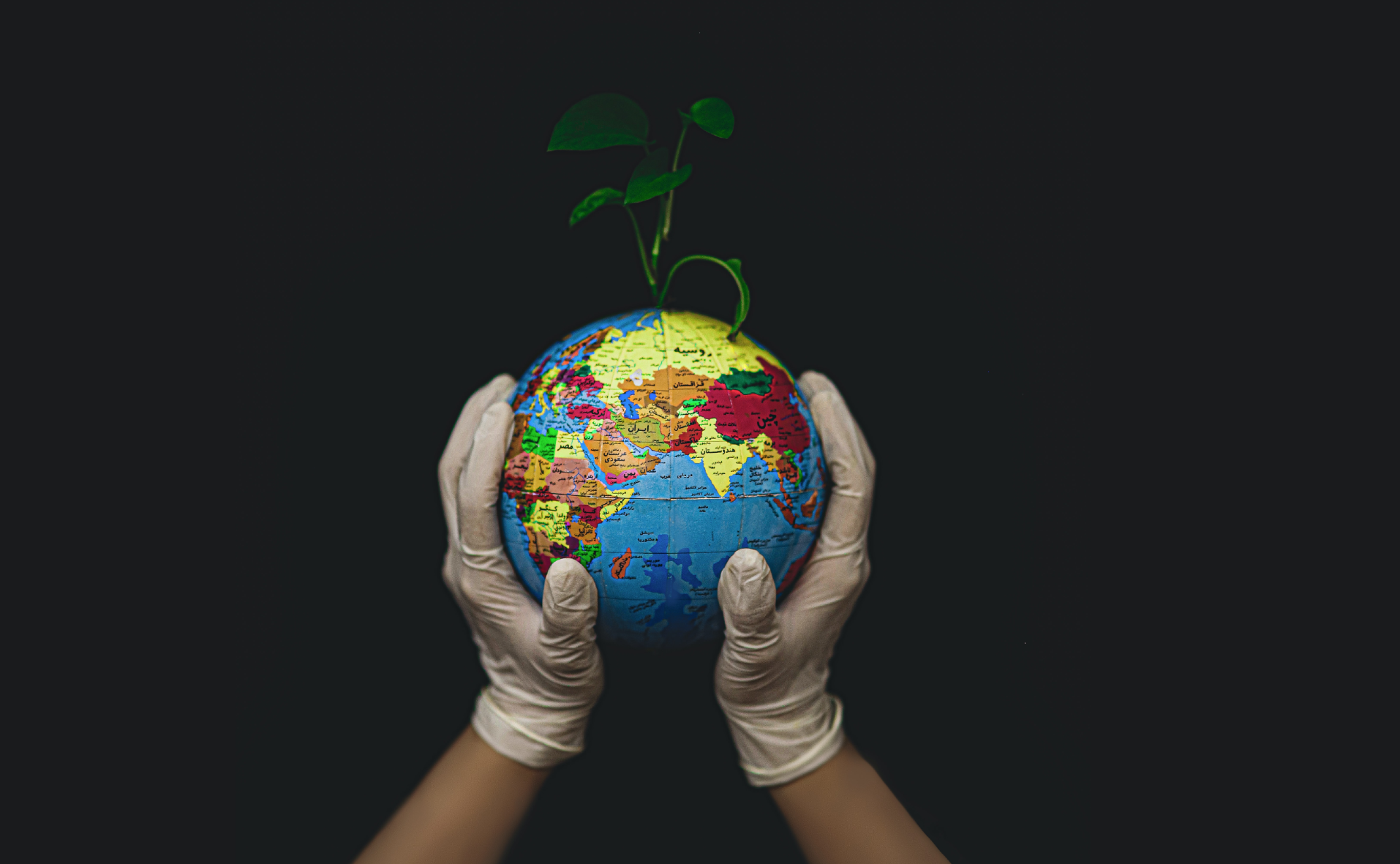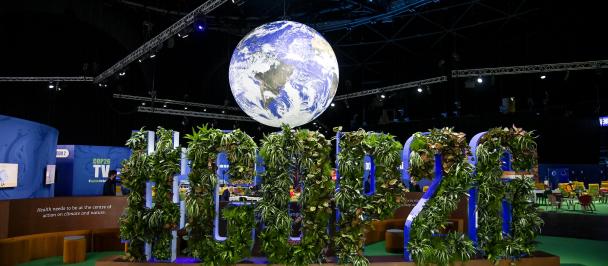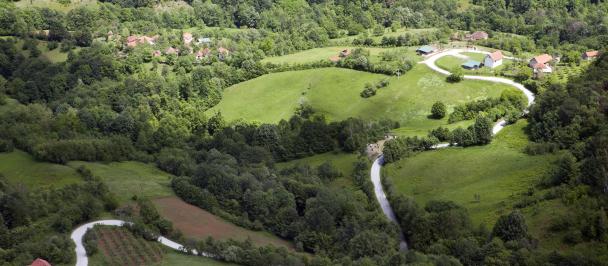Every year on April 22, Earth Day marks the anniversary of the birth of the modern environmental movement in 1970. Its mission is to educate more and more people about environmental concerns and for this movement to keep growing to create change and positive action for the people and the planet. As the climate emergency deepens, each successive Earth Day takes on a greater urgency in the fight against the global crisis.
Celebrated every year on April 22, the international day of environmental action draws in an estimated one billion people - making it the largest secular observance in the world.
The dangers and problems that threaten our planet today are much greater than 51 years ago, when the celebration of this day began, and it is the obligation of each individual to contribute to the Earth being cleaner and more beautiful.
On this occation, The Center for the Promotion of Science (CPN) talked with Francine Pickup about the challenges and plans to make the environment in Serbia better.
Unfortunately, these days we are overwhelmed by the global concern about the corona virus, in fact for more than a year the pandemic has been a priority topic. The whole planet has slowed down the rhythm of the economy and accelerated the exchange of various information and thoughts. Some scientific papers prove the benefits of this slow economy to climate change. How do you view these causal relationships?
While it is true that greenhouse gas (GHG) concentrations, as well as air pollution, decreased last year in Serbia, these effects of the COVID-19 induced lockdown and economic slowdown were only temporary. As the COVID-19 Socio Economic Impact Assessment for Serbia has shown, these short-term environmental benefits were mainly caused by a drop in industry, transport, and agriculture sectors as well as by reduced traffic and human activity.
In reality, the Covid crisis resulted in a large increase in the volume of waste and budget cuts in the environment sector. And in the longer term, the pandemic did not stop the rise of GHG emissions. According to the “United in Science 2020” report, GHG concentrations are at record levels and continue to increase, despite a temporary decline in the first half of 2020, due to the pandemic. The period from 2016 to 2020 will be the warmest on record, while the intensity and frequency of extreme weather have increased, both globally and in Serbia, negatively affecting food and energy production, biodiversity, availability of drinking water, endangering property and people's lives.
UNDP’s 2020 Human Development Report demonstrated that it is no longer feasible to keep the economy growing at the expense of the planet. Thirty years ago, this report pioneered the concept of human development that encompasses a nation’s health, education, and standard of living, recognizing them as critical to a country’s development, alongside economic growth. Last year’s report included two more indicators: a country’s carbon dioxide emissions and ‘material footprint’, which represents the amount of raw materials extracted to meet consumption demands. Adding these two new environmental factors changes our understanding of progress in global development. For example, 50 countries drop out of the very high human development group, due to their impact on the environmental degradation and climate change. The conclusion is clear - if we don’t take bold steps to reduce the immense pressure that is being exerted on the environment and the natural world, humanity’s progress will also stall.
The reason for our conversation is Earth Day and we all need motivation to act. Can financial analysis be most important argument for state-level plans to be given a different priority? How different is the approach to climate change in developed countries compared to the approach in underdeveloped countries, given that we are all in a similar problem?
I would say that climate change is similar to the pandemic in that it is an urgent and complex global challenge. But the responses vary from country to country, including their motivation to act and financial resources available. While large countries are the biggest emitters of GHG, smaller countries such as Serbia also add up to the total sum of global emissions. That is why we all need to act together to obtain “herd immunity” to climate change.
Addressing climate change, which is the greatest issue of our time, will require massive changes. Last year we witnessed that humanity is ready to make radical changes, even overnight. Now is the right time to change our ways, transform our economies and adapt our behaviour to climate change.
Many recognized that the ‘old normal’ was not good enough and that now we have an opportunity to create a different way of living. To build forward better and improve the resilience of economies and societies for future crisis – we need a green recovery. Transition to a green economy requires a change in unsustainable patterns of energy and resource consumption. We need to decouple economic growth from extensive resource use and fossil fuels as foundation for energy production. This can be done by shifting from a linear economy heavily dependent on fossil fuels, to a low carbon and circular economy.
And it is good for the economy too. When we talk about Serbia, the costliest scenario is to ignore the climate-related costs in its strategic decisions. Serbia’s economy already suffered losses amounting to more than $6 billion since the year 2000 from the extreme weather. UNDP’s Assessment of the Socio-Economic Impact of Climate Change for Serbia concludes that if the country fails to decarbonize its economy the bill may amount to $11 billion by 2030.
For the Serbian economy to be competitive now and in the future, particularly on its key export market – the European Union, the public and private sectors need to invest in green transformation.. Green investments today will pay dividends tomorrow.
The good news is that funding for the green transition is available. For example, the European Green Deal and the Green Agenda for the Western Balkans that will guide the EU investments in the next seven years, foresee 9 billion EUR of grant funds for the countries of this region, for a shift towards decarbonization, circular economy, depollution, sustainable food systems and to protect biodiversity.
Numerous international sources of information indicate that Serbia will be more affected by climate change than some other parts of Europe. We know that UNDP in Serbia invests a lot of effort, resources and financial resources for numerous projects that encourage the fight and attention to climate change. How can we speed up the process of raising awareness of all actors in this dialogue, and start urgent implementation of adaptation measures?
Serbia is in a region that is highly vulnerable to climate change, where the average temperature increase is much higher than the global average. In Belgrade alone, 13 out of 15 warmest years ever recorded - were after 2000. Rising temperatures will cause more frequent and extreme heat waves, severe drought episodes and flash floods.
Such negative impacts stemming from climate change will affect human lives, putting additional pressures on already stretched health and social protection systems and slowdown Serbia’s economic development.
On an optimistic note, there are signs that Serbia is showing political commitment to the transition to a low-carbon and circular economy. Last month the Law on Climate Change was adopted. Serbia is also expected to increase its Nationally Determined Contributions’ goal and cut GHG emissions by 33% by 2030.
Also, UNDP and the Government of Serbia, with the support of the Green Climate Fund, have joined forces to develop the country’s first National Climate Change Adaptation Plan, to reduce the impact of climate change on the economy. To raise awareness of all actors needed to implement these adaptation measures, we have started a series of dialogues to include all the stakeholders from the government, civil and private sector.
Together, we are preparing concrete adaptation measures in key sectors recognized as the most vulnerable: agriculture & water management, energy, transport and construction infrastructure. To support these measures and actions we will also work on setting up a sustainable financing strategy.
For example, careful selection of materials and construction techniques can make a big difference, particularly now when Serbia has accelerated its infrastructure works, including building of roads, railways, and residential buildings.
To ensure climate adaptation, more permeable materials could be used when building the roads and streets, allowing absorption of higher quantity of water. Additionally, adjusting and expanding the sewerage systems on roads could help in the event of heavy rainfall.
Besides defining concrete adaptation measures, UNDP is also assisting institutions at both national and local level to address climate change in strategic planning, legislation, and investments planning. This will help them to timely undertake the necessary actions and respond to major climate risks.
At the recently held an online event titled “Dialogue on Serbia's adjustment to climate change” you also pointed out that Serbia has suffered damage of six billion dollars due to climate change since 2000, and risks losing so much more by 2030 if it does not take appropriate measures. What should be done to avoid this?
Besides national and local policy measures that I mentioned, I would also like to emphasize that there are no solutions to environment and climate change issues without the private sector.
In partnership with the EU delegation UNDP recently conducted a Green Recovery Study focused on the backbone of Serbian economy – micro, small and medium sized companies, or MSMEs.
Importantly, the results show that many MSMEs in Serbia are willing to invest in more energy-efficient and environmentally friendly processes, but they continue to face numerous barriers to these green investments. These include lack of capital, insufficient skills and information about green technologies and financial products, and inadequate support from the regulatory environment. Also, some companies said that they had to postpone implementation of their green projects, because the investments were delayed or downsized due to the pandemic.
The study has shown us that, for scaling up the green transformation, it is critical to ensure assistance for private sector in three key areas.
First, we need to focus on, and adjust the regulations. In essence, legislation should support businesses to go green, not restrain them. For example, instead of high administrative requirements for green investments, the procedure for environmental compliance needs to be clear, easy to assess and follow, less time-consuming and requiring a minimum of documentation.
Second, we need to educate companies on how to make their businesses greener. To accelerate this transition in Serbia, in partnership with the Chamber of Commerce UNDP has supported the creation of a Circular Economy Hub as a one stop shop that will provide education and training to companies on how to transition to a circular business model.
And third, businesses need support in access to finance. UNDP has supported businesses to develop green business ideas that can then secure investment. With support from the Global Environment Facility and Swedish International Development Agency – SIDA, UNDP helped over 20 companies to expand their business operations. Biogas power plants gained access to favourable bank loans, while companies contributing to the circular economy and the ones introducing new technologies that reduce GHGs in urban areas - received co-funding. In doing so, we successfully mobilized more than $40 million in private sector investments and borrowing for green climate solutions.
Through our work we have seen that many SMEs in Serbia are already reaping the economic benefits of going green. To illustrate, some companies now produce biogas out of food leftovers from restaurants or make bio pellets and organic fertilizer from the remains of the plants used for essential oil production – thereby cutting fuel, energy and waste disposal costs.
We need more good examples like these and at a bigger scale.
When you addressed at the 9th Belgrade Security Forum, you pointed out that cities have a key role to play in fighting climate change, which is why at the recent UN Climate Change Summit in New York, leaders of states, private sector and civil society have launched numerous initiatives to transform cities into energy-efficient, inclusive and sustainable places to live. At the Summit, the youth took the front and centre stage and sent a clear message that we are responsible for taking action immediately. Can ordinary citizens of Belgrade, independently or jointly, do something to mitigate or reduce the consequences of climate change? What would be your message to the citizens of Belgrade?
To reduce the effects of climate change we need joint efforts at all levels, and that includes the citizens as well. When I first came to Serbia two years ago, I was surprised that there was no prominent citizens’ climate action movement that we see in some other countries. This is now changing as we see growing public pressure for change.
Last year, within worldwide consultations on the occasion of the UN’s 75 anniversary, a survey conducted in Serbia revealed that people consider better care for the environment as one of the three government priorities, next to the universal access to health services and tackling inequality.
Individually, we can all do something on a daily basis to mitigate climate change. For example, by buying only as much as we really need, especially when it comes to food, to minimise the amount of waste we produce, as well as by recycling our waste and saving the water and energy we spend in our homes.
Initiatives such as an interactive map of the TeRRIFICA project, that encourages citizens to act as scientific researchers and collaborators and mark the challenges caused by climate change, is a good example of how the citizens can be more engaged in highlighting climate problems in their immediate surroundings. I am looking forward to seeing more contributions by the citizens of Belgrade as well as their proposals on how to make Belgrade a climate smart city.
I would also like to invite the people in Serbia to help us detect illegal waste sites in the country. They can now do it easily and anonymously through the mobile app “Ukloni divlju deponiju!” (Remove the illegal waste site) that UNDP developed in partnership with the Serbian Environmental Protection Agency (SEPA). The app enables citizens to report the illegal waste site they come across directly to SEPA, and the Agency will make this information publicly available on their map of illegal waste sites in Serbia. This will make local governments, who are in charge of landfill removal, aware of their locations, thus helping to clear them.
Another example relates to the issue or air pollution, which has gained a lot of attention lately. To help curb air pollution UNDP has invited innovators to propose new solutions to improve air quality in local environments. Through Clean Air Innovation Challenge that UNDP launched in cooperation with UNICEF and World Health Organization (WHO) we recently chose and presented 14 most innovative ideas for better air quality in Serbia. These are solutions for better air quality monitoring, air purifiers, improved fuel combustion, reduction of air pollution impact on children, as well as solutions for detecting air pollutants. We have also invited donors, national and local governments to help implement in practice the best ideas, ensuring cleaner air in Serbia in the long run.
UNDP supported one innovative solution, designed by the team of Biosense Institute in Novi Sad. This solution will help detect the locations of stubble burning, which is very common in Serbia after the harvest season. Except for the fact that it destroys humus in the soil, it also poses threats to the surrounding ecosystem, additionally pollutes the air and increases the CO2 emission. Using innovative technological solutions and digital tools, the Biosense Institute team will detect stubble burning locations, thus helping prevent the wildfires and their negative impact on air quality.
In addition to contributing to a healthier living environment, innovative solutions such as this one, also have the potential to stimulate local economic development, innovation and entrepreneurship, which is crucial for the successful green transition in Serbia.
My message for the citizens of Belgrade, but also the citizens of Serbia, is that while noticing problems in our surroundings caused by the climate change is the first step in addressing them, we should not stop there. I believe we need more people, especially the young women and men, to be active and engage in coming up with proposals and solutions on how best to tackle climate change issues.

 Locations
Locations



